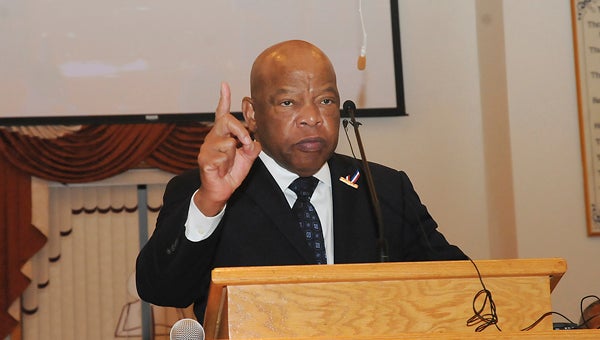State senate greenlights $2.3B General Fund budget
Published 2:49 pm Wednesday, May 6, 2020
|
Getting your Trinity Audio player ready...
|
The Alabama Legislature reconvened Tuesday after a weeks-long hiatus due to the COVID-19 pandemic and in short order approved the state’s General Fund budget for Fiscal Year 2021, which begins Oct. 1, by a 31-0 vote.
The General Fund budget, which includes all of the state’s non-education spending, set aside an additional $35 million for the Alabama Department of Public Health (ADPH) and increase of $94 million for the Alabama Medicaid Agency.
The budget also includes an additional $3 million for the Alabama Law Enforcement Agency (ALEA) to hire 25 new state troopers, as well as an additional $23 million for the Alabama Department of Corrections (ADOC) and an extra $25 million for the Alabama Department of Mental Health (ADMH).
“This year, we pumped up the agencies and department in need since they are under siege,” said Alabama Sen. Greg Albritton, R-Atmore, Chairman of the Senate Finance and Taxation General Fund Committee. “We also wanted to make sure they had enough resources to properly respond to the issue at hand. We put a priority on public safety, with an increase for additional troopers on the road and conditional appropriations for the Department of Corrections. None of the money allocated was received from the federal government, meaning we expect to have additional money made available to the state general fund due to the COVID-19 outbreak.”
The senate also approved the “Rolling Reserve” for the General Fund, which Albritton praised as a show of the chamber’s “conservatism,” noting that the state workforce has been cut by 14 percent since 2011 in the interest of saving money.
“Obviously, this is not the budget we thought we would have when the session started,” said Alabama Senate Pro Tempore Del Marsh, R-Annison. “However, this is a strong budget that gives state agencies a place to start as they work on their individual budgets for next year. If we determine that changes to this budget need to be made, we can still do so next session without additional expense to the taxpayers in a special session.”
Alabama Sen. Malika Sanders-Fortier, D-Selma, who was among the 31 senators to vote in support of the budget, noted that healthcare agencies and first responders needed the extra support provided in the budget, but noted she would have liked to see other priorities funded in the budget.
“I would have loved for it to have included the estimated $167 million match for over a billion dollars in federal funds we needed to insure all of the working Alabamians who are without healthcare during this healthcare crisis,” Sanders-Fortier said. “This would also beef up our healthcare system in Alabama overall, which makes hospitals, both in rural and larger cities, better equipped to help all Alabamians.”
Sanders-Fortier also noted the need for funds to support local governments, which are experiencing decreased revenue as a result of the COVID-19 pandemic while still having to take on more responsibilities, and for steps to be taken to “thin out” the state’s overcrowded prison population, noting that Alabama Gov. Kay Ivey’s plan to address the issue is three years down the road.
“I just don’t think I can stand before God, who said that when we show concern for those in prison we show concern for Him, and not do something about this very dangerous situation, too,” Sanders-Fortier said. “I know people whose lives have changed while in prison, who are now ministers of the gospel who are in there. These are people’s brothers, fathers, sisters and mothers in there. I feel strongly that it is an emergency situation to deal with overcrowding during COVID-19.”
Sanders-Fortier noted that she has introduced legislation tackling the issue.
The General Fund now goes before the Alabama House of Representatives for consideration, where Democrats have already voiced concern over plans to pass both the state’s General Fund and Education Trust Fund budgets in quick fashion.
House Democrats released a statement last week blasting plans to “rush” the budget and called for a special session to be called so that legislators could better determine what the state’s needs would be following the coronavirus crisis.
As the Alabama Senate was passing a budget Tuesday, House Democrats were holding a series of virtual sessions aimed at gathering “critical information” related to the coronavirus outbreak and the fiscal needs the state will face as a result.
“There is simply no way we could pass responsible budgets right now,” said Alabama Rep. Napoleon Bracy Jr., D-Mobile, a member of the House Ways and Means General Fund Committee, which will take up the budget before it appears on the House floor. “We don’t even have the most basic information to pass informed budgets. We cannot and should not be in a rush to craft budgets when we’ve still yet to fully grasp the impact of this pandemic on our citizens, small business owners, major employers, schools, healthcare systems, city budgets and more.”
House Democrats were slated to hold another round of virtual meetings Wednesday.
And while the state’s budgets are the legislature’s chief priority, a bill introduced Monday by Alabama Sen. Arthur Orr, R-Decatur, seeks to take aim at the coronavirus crisis from a different angle by providing civil immunity to a host of businesses and other operations against damages claimed by people who allege they contracted or were exposed to COVID-19.
The bill’s text states that “[p]roviding reasonable protections from the risk and expense of lawsuits to businesses will help encourage businesses to remain open and reopen and that providing such a safe harbor to businesses that operate reasonably consistent with applicable public health guidance will help ameliorate the social harms of a closed economy and the resulting unemployment.”



